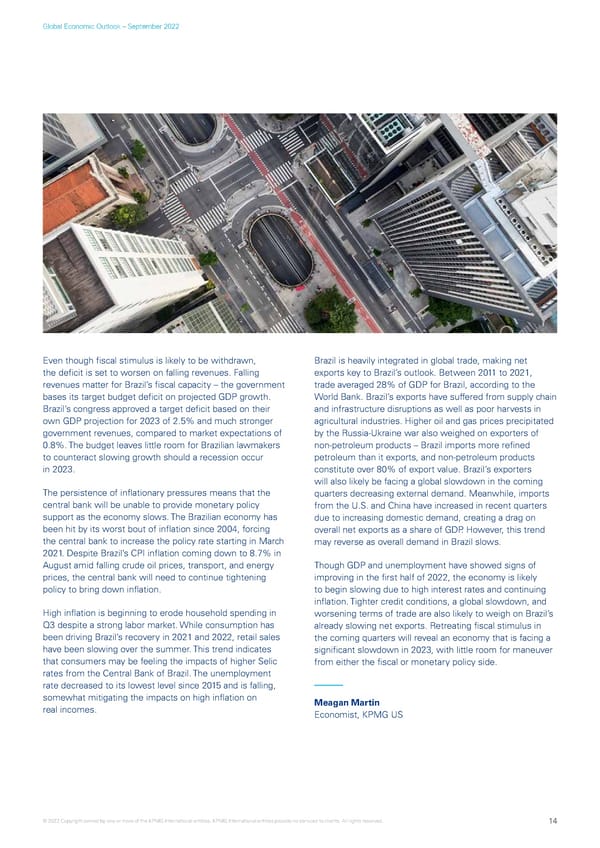Global Economic Outlook – September 2022 Even though fiscal stimulus is likely to be withdrawn, Brazil is heavily integrated in global trade, making net the deficit is set to worsen on falling revenues. Falling exports key to Brazil’s outlook. Between 2011 to 2021, revenues matter for Brazil’s fiscal capacity – the government trade averaged 28% of GDP for Brazil, according to the bases its target budget deficit on projected GDP growth. World Bank. Brazil’s exports have suffered from supply chain Brazil’s congress approved a target deficit based on their and infrastructure disruptions as well as poor harvests in own GDP projection for 2023 of 2.5% and much stronger agricultural industries. Higher oil and gas prices precipitated government revenues, compared to market expectations of by the Russia-Ukraine war also weighed on exporters of 0.8%. The budget leaves little room for Brazilian lawmakers non-petroleum products – Brazil imports more refined to counteract slowing growth should a recession occur petroleum than it exports, and non-petroleum products in 2023. constitute over 80% of export value. Brazil’s exporters will also likely be facing a global slowdown in the coming The persistence of inflationary pressures means that the quarters decreasing external demand. Meanwhile, imports central bank will be unable to provide monetary policy from the U.S. and China have increased in recent quarters support as the economy slows. The Brazilian economy has due to increasing domestic demand, creating a drag on been hit by its worst bout of inflation since 2004, forcing overall net exports as a share of GDP. However, this trend the central bank to increase the policy rate starting in March may reverse as overall demand in Brazil slows. 2021. Despite Brazil’s CPI inflation coming down to 8.7% in August amid falling crude oil prices, transport, and energy Though GDP and unemployment have showed signs of prices, the central bank will need to continue tightening improving in the first half of 2022, the economy is likely policy to bring down inflation. to begin slowing due to high interest rates and continuing inflation. Tighter credit conditions, a global slowdown, and High inflation is beginning to erode household spending in worsening terms of trade are also likely to weigh on Brazil’s Q3 despite a strong labor market. While consumption has already slowing net exports. Retreating fiscal stimulus in been driving Brazil’s recovery in 2021 and 2022, retail sales the coming quarters will reveal an economy that is facing a have been slowing over the summer. This trend indicates significant slowdown in 2023, with little room for maneuver that consumers may be feeling the impacts of higher Selic from either the fiscal or monetary policy side. rates from the Central Bank of Brazil. The unemployment rate decreased to its lowest level since 2015 and is falling, somewhat mitigating the impacts on high inflation on Meagan Martin real incomes. Economist, KPMG US © 2022 Copyright owned by one or more of the KPMG International entities. KPMG International entities provide no services to clients. All rights reserved. 14
 KPMG Global Economic Outlook - H2 2022 report Page 13 Page 15
KPMG Global Economic Outlook - H2 2022 report Page 13 Page 15